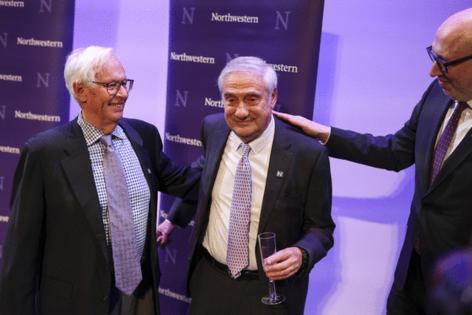Northwestern University professor shares Nobel Prize in Economics
Published in News & Features
A Northwestern University professor has been awarded the Nobel Prize in Economic Sciences for his historical studies on sustained economic growth through technological progress.
Joel Mokyr, who has taught economics and history at Northwestern for more than a half century, was lauded by the Nobel committee Monday for demonstrating how innovations become a “self-generating process,” building upon previous advances to improve standards of living.
“I study economies in the past and try to figure out what makes them prosper, what makes them do well, how population grows, what kind of relations there are between workers and employers,” Mokyr told the Tribune. “I use, basically, economics to study history.”
He shares the award with Philippe Aghion of Collège de France and the London School of Economics, and Peter Howitt of Brown University, whose work also explored the mechanisms behind innovation and sustained economic growth.
Mokyr learned of his Nobel Prize award Monday morning while vacationing at his summer home in Michigan. He described the news as hitting like a “thunderbolt on a clear day,” prompting a triumphant and quick return to Evanston.
“I was surprised, because like every other academic economist, I had a list of people that were likely to win, and I wasn’t on my own list,” Mokyr said, while driving back with his wife and dog.
An expert on the economic history of Europe, Mokyr earned a bachelor’s degree in economics and history from Hebrew University of Jerusalem, and his master’s and Ph.D. in economics from Yale.
The author of several influential books on the convergence of technology and economic growth throughout history, Mokyr has spent his entire teaching career at Northwestern.
“It was my first job, my only job,” Mokyr said. “I arrived here in 1974. On the drive from the East Coast to Evanston, I heard Richard Nixon had resigned on my car radio.”
As artificial intelligence and other technologies are poised to rapidly change the way the world does business, the Nobel economic sciences committee noted that societies must be open to the “never-ending cycle” of new products and production methods replacing old ones.
The work of this year’s three Nobel Prize winners demonstrates the importance of learning from the past, the committee said.
“The laureates’ work shows that economic growth cannot be taken for granted. We must uphold the mechanisms that underly creative destruction, so that we do not fall back into stagnation,” John Hassler, chair of the committee for the prize in economic sciences, said in a news release.
Mokyr’s work focused on how societies such as Europe after 1600 became “technologically progressive,” as opposed to China and the Middle East at the same time, creating a “remarkable” difference in advancement, he said.
By studying economic history, Moykr’s work may show the past is prologue in understanding the road ahead.
“Joel Mokyr serves as a brilliant example of the power of interdisciplinary work to better understand our past, present and future,” Northwestern Provost Kathleen Hagerty said in a news release.
This is the fourth Nobel Prize awarded to a Northwestern faculty member. Fraser Stoddart won the Nobel Prize in Chemistry in 2016, Dale Mortensen received it for Economics in 2010 and John Pople won the Chemistry award in 1998.
It is just the latest Nobel win for a Chicago economist. Last year, James A. Robinson, an economist and political scientist at the University of Chicago, shared the award with two professors from the Massachusetts Institute of Technology.
Mokyr was awarded half of the 2025 Nobel Prize, while Aghion and Howitt split the other half. The Nobel Prize in Economic Sciences includes a cash award of 11 million Swedish kronor, or about $1.16 million.
Reflecting in real time on the award and his lengthy career in academia as he navigated the Chicago Skyway homeward Monday, Mokyr remained genuinely humbled by the ultimate recognition of his work.
“I never thought that what I did was worth a Nobel Prize — I never seriously considered it,” Mokyr said. “I was surprised more than anything else. But as the saying goes, I’ll take the money.”
_____
©2025 Chicago Tribune. Visit chicagotribune.com. Distributed by Tribune Content Agency, LLC.







Comments